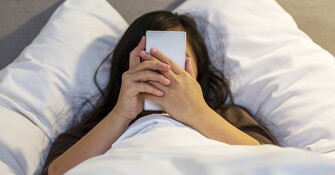
For decades, the image of a kid curled up in bed has included a pillow, a cuddly blanket, maybe a beloved teddy bear.
In the digital age? Add a cellphone or tablet to that picture.
Teenagers are more than twice as likely as their parents to sleep with their devices right in the bed with them, according to a report released Wednesday by Common Sense Media, a nonprofit based in San Francisco that studies the impact of technology on learning and child development.
Twelve percent of parents keep their devices in bed, compared with 29 percent of teenagers.

That’s a striking finding, said Michael Robb, the senior director of research at Common Sense. That “represents to me even more of an attachment than just kind of keeping it next to your bed,” he said.
What’s more, even if kids aren’t actually sleeping with their devices, they typically aren’t far from their bedside. Nearly 40 percent of children sleep with a phone, tablet, or other device within reach, the survey found. By contrast, 62 percent of parents say they keep their device where they can reach it in the middle of the night, or first thing in the morning.
That’s despite recommendations from the American Academy of Pediatrics, which recommends that children’s bedrooms remain “tech-free zones.” And the National Sleep Foundation suggests setting a “digital curfew” of at least 30 minutes before bed time, ideally longer.
Teens are also more likely than their parents to check their mobile device in the middle of the night, after they’ve fallen asleep. About 36 percent teenagers say they wake up at least once a night to check their device, compared with 26 percent of parents.

What’s more, kids are more apt to check their devices within 5 minutes of waking up. Thirty-two percent of teenagers say they check their devices within 5 minutes of waking up, and 40 percent say they check them within 5 minutes of going to bed. That’s compared with 23 percent of adults checking their devices within five minutes of waking up and 26 percent within 5 minutes of bedtime.
There are big questions about the impact of that behavior on sleep, Robb said.
“How then is it affecting their sleep hygiene, which we know is very important for a range of positive academic outcomes, physical outcomes, social-emotional outcomes?” he said. “The link between sleep and a lot of those things is actually a lot stronger than the link between screen time and various poor outcomes.”
The findings are unlikely to come as a surprise to educators. An overwhelming 95 percent of principals told the Education Week Research Center last year that students spend too much time on devices when they’re not in school.
In fact, Jethro Jones, the principal of Tanana Middle School in Fairbanks, Alaska, thought the numbers of kids sleeping with their devices would “actually be higher.”
In his 13 years as an educator, he’s noticed that students are becoming “more belligerent and snippy.” He thinks the rise of technology—and its impact on sleep&mdsah;could be part of the reason.
“Prioritizing checking their phone over sleep, that is like the worst thing they could actually do,” said Jones, who was a National Association of Secondary School Principals digital principal of the year in 2017.
Of course, Jones said, principals rely primarily on parents to monitor their child’s device usage, but he believes, “it’s something we can certainly influence.”
His solution: Jones has offered parents a teen cellphone agreement designed by Josh Shipp, a motivational speaker and author. It requires kids to turn their cellphone passwords over to their parents, and hand in their device at a certain time of day. It also asks kids to initial statements like: “When I am old enough, I won’t text and drive. I understand it’s very dangerous and pretty stupid.”
Jones is also considering creating a badge for digital literacy at his school, which would require students to agree to turn their devices off 30 minutes before bedtime, and not to check them until they’ve been up for at least 30 minutes.
And in his own house, where he has four children aged seven to 13? “We put all of our devices in a charging station in the kitchen” instead of taking them to bed at night.”
The Common Sense survey has a margin of error of 4.4 percent. It was conducted using both professional telephone interviews from February 2 to February 27 of this year, and using an online platform from February 19 to March 1. It reached a total of 1,000 parents and children.
Image: Getty Images
